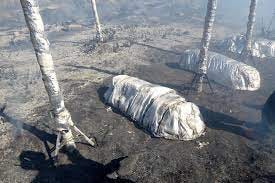Wildland Fire
It's not always about race
In order to “give back” to the public lands and people from which I made a career as well as supplement my retirement income, I remain on a wildland fire management team. With the change in the earth’s climate and the noticeable change that has brought to wildland fires, I could go out most of the season. But because of The Civil Conversations Project I limit my involvement to usually four weeks a year. With the over-abundance of snow most of the west received this year – the 11,000 foot Grand Mesa and xc ski mecca that my town of Grand Junction CO rest against, received just shy of five stories of snow – I wasn’t expecting to go out at all. But the Pacific Northwest kinda blew up a few weeks ago and here I am on the small Blue Lake Fire in the North Cascades mountain range. I’m not doing the hero stuff. I sit in a heated or air-conditioned yurt all day and do management stuff running the medical component.
This morning I was driven out to a memorial to honor five young firefighters who died near here in 2001 on the Thirty Mile Fire on the Okanogan Wenatchee National Forest. Twenty-one year old Devin Weaver from Yakima WA; Jessica Johnson, 19, also from Yakima; Karen Fitzpatrick, 18, from Yakima; and Tom Craven, 30, from Ellensburg. It was more moving and poignant than my usual days on a fire. https://archive.seattletimes.com/archive/?date=20010729&slug=fire29m
As the fire, moving at 125 feet per minute and roaring like a freight train began to overrun them, the firefighters ran up the talus slope and deployed their shelters just above and to the left of the fallen, silver-grey log. But being unable to obtain a tight seal around the bottom of the shelter due to the nature of the terrain, their lungs were overcome by the super-heated gases.
Example of shelter deployment - above
“What does this have to do with race?” you may be asking. Nothing. It’s just something I wanted to share. Some firefighters are actual heroes and pay the ultimate price.




